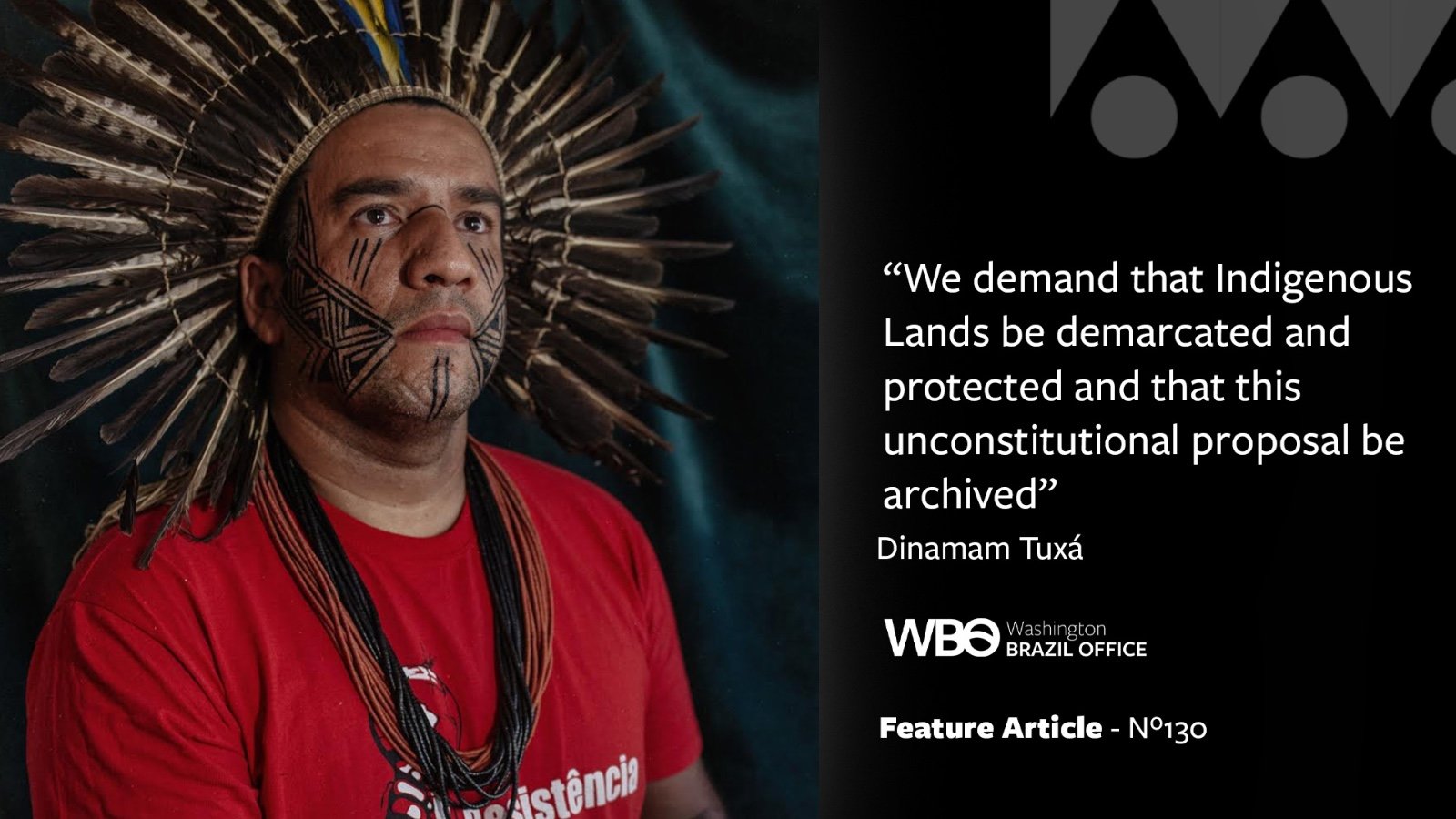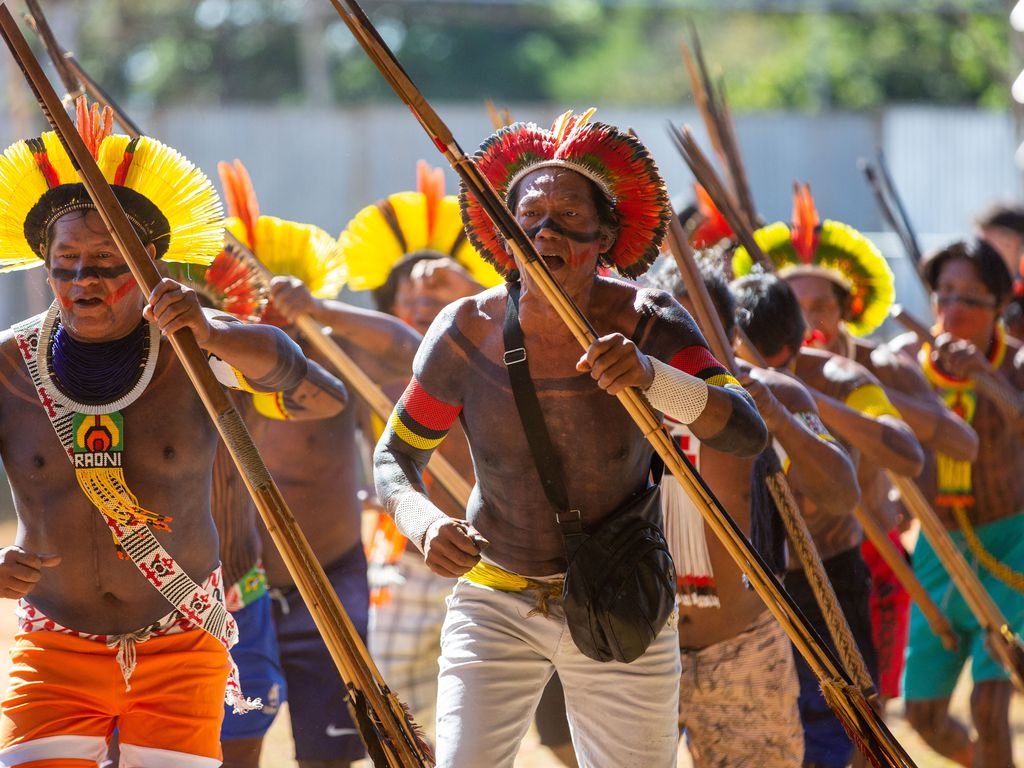Indigenous Rights Must be Guaranteed and Not Negotiated
Dinamam Tuxá, executive coordinator of the Articulation of Indigenous Peoples of Brazil (APIB). This article was written for issue 130 of the WBO weekly newsletter on August 16, 2024. To subscribe to the bulletin and receive it for free, enter your email in the field below.
The Temporal Framework thesis regarding the demarcation of Indigenous territories was declared unconstitutional by the Brazilian Supreme Court in September 2023, but threats against the fundamental rights of Indigenous peoples continue. On the same day that the anti-Indigenous thesis was overturned in the Supreme Court, Senator Hiran Gonçalves (Progressive Party) presented a proposed amendment to the constitution (PEC) 48/2023 in the Senate. The proposal must be discussed in the Committee on Constitution, Justice and Citizenship by October 30.
Named by the Indigenous movement as the “PEC of Death,” the proposal aims to amend Article 231 of the Federal Constitution, which recognizes the original right to occupy our territories, and insert the Temporal Framework, which would not recognize any new Indigenous territories. The senators' goal is to ensure that Indigenous peoples only have the right to claim certain land if they were already there when the Constitution was enacted on October 5, 1988.
Last year, the Brazilian Congress approved and enacted the Indigenous Genocide Law (Law 14,701/2023), which transformed the Temporal Framework and several crimes against Indigenous peoples into law, such as contesting demarcations, in addition to allowing outside invasions of Indigenous Lands to be considered in good faith. The approval is a clear reflection of the tug-of-war between the legislative and judicial branches of the Brazil government.
Now, the Indigenous Genocide Law is being discussed in a conciliation committee, created by Supreme Court Justice Gilmar Mendes. The justice has ignored the requests of the Indigenous movement, made through the Articulation of Indigenous Peoples of Brazil (APIB), for the law to be suspended.
We were present at the first hearing of the conciliation committee, when we pointed out the insecurity that this legislation poses to us, and we demanded the suspension of the law, which has not been acted upon by the Court to date. We reiterate that we will not negotiate away any rights of Indigenous peoples, but rather will defend that these rights be guaranteed. We ask that the Supreme Court justices do not go back on what has already been decided by the Court: the Temporal Framework thesis is unconstitutional.
At the same time, members of the Brazilian Congress know that they cannot change the constitution through a bill, and so they are trying to approve PEC 48/2023 to firmly establish the Temporal Framework in Brazil.
For us, Indigenous peoples, who are the true guardians of the Brazilian biomes, this proposal represents violence against our bodies, territories, and rights. The Framework thesis ignores the violence and persecution that we have faced for over five hundred years, especially during the military dictatorship (1964-85). These persecutions made it impossible for many peoples to remain in their territories in 1988, just as today farmers, miners and land grabbers are trying to expel us and destroy our lands.
From the North to the South of Brazil, the Temporal Framework has led to deaths in Indigenous Lands, as we are seeing with the Guarani Kaiowá people in Mato Grosso do Sul, with the Tapeba in Ceará, and the Pataxó in Bahia. In 2023, there were 208 cases involving the murder of Indigenous peoples, representing a 15 percent increase compared to 2022, not to mention other violations resulting from invasions and illegal exploration in our territories.
If approved, the PEC of Death will legitimize all of this. It is important to emphasize that we are talking about an unconstitutional amendment proposal, since the fundamental rights of Indigenous peoples in the Federal Constitution of Brazil are enshrined in constitutional clauses, that is, they cannot be revoked or reversed by the Congress. APIB demands that PEC 48/2023 be withdrawn from the debate and archived immediately. The fundamental rights of Indigenous peoples must be guaranteed and not negotiated by Congress, the Supreme Court, or any other state body.
That is why we resist with the strength of the headdresses and the ancestry of the more than 300 indigenous peoples in the country. We are mobilizing leaders and grassroots organizations to occupy Brasília, all capitals, territories, and social networks. Allied jurists, senators, and congressional representatives are also joining the fight, but we need the support of the ministers of the executive branch, President Lula and public opinion.
We demand that Indigenous Lands be demarcated and protected and that this unconstitutional proposal be archived and remembered in history as the PEC of Death, regression, and agribusiness.


